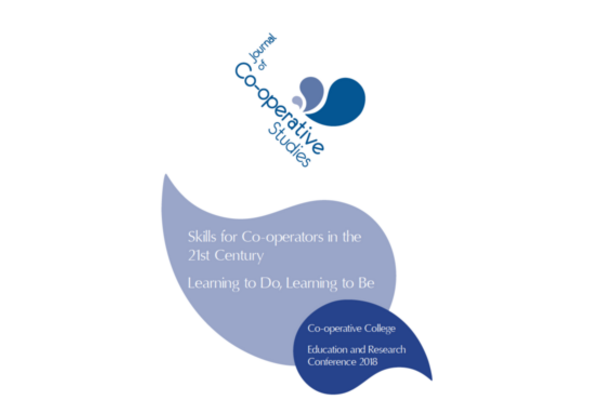Table of Contents
Guest Editorial
Dr Amanda Benson, Dr Cilla Ross & Dr Sarah Alldred, Co-operative College, UK.
2018 - Co-operative College special issue: Skills for Co-operators in the 21st Century — Learning to Do, Learning to Be
Peer reviewed papers
Critical thinking for an engaged university
David Davies and James Nyland, pp. 5-18
ABSTRACT
Globalisation, ,marketisation monetisation, and the growth of hyper-capitalism have all impacted on modern universities. As mass higher education has developed, universities have become severely marginalised from their communities and original purposes. The idea that mass participation can solve the problems on its own has proved illusory. The output of graduates does not compensate for the poor quality of jobs available for many and for the elitist assumptions which drive selection for the ‘top’ institutions and induction into the leading professions.
The learning and teaching we now have is not sufficiently engaged with the critical issues facing our society. Some of these issues are to do with belonging, community, identity, nationhood and culture whilst others include poverty, exclusion, migration, war, terrorism, global climate change, and environmental degradation. These issues raise questions which test our humanity and the appropriateness of our universities and their curricula.
The other key concern is the impact of technology on ‘life and labour’ which is abolishing meaningful work for many and making some traditional communities obsolete. The internet and digital life must be democratically controlled and we must understand its complexity. The proposed Co-operative University could become an ‘engaged university’ with a distinctive learning programme which addresses the issues raised above. A critical pedagogy is needed as well as a critical curriculum.
Keywords: co-operative university; engaged university; critical pedagogy; higher education
Living co-operative values in educational contexts
Marie Huxtable and Jack Whitehead, pp. 19-28
ABSTRACT
In this paper we offer an argument that a co-operative University could make a distinctive contribution by focusing on the development of educational contexts and epistemology with co-operative values forming the explanatory principles and standards by which practice and knowledge is recognised, understood and judged. We believe that individual practitioner-researchers can make a contribution to the realisation of co-operative values in practice by generating and sharing their explanations of educational influences in learning as they work and research, to live as fully as possible values that contribute to the flourishing of humanity. The values focused on are those of the International Co‑operative Alliance.
We show how Living Theory research is particularly appropriate for researchers developing educational contexts and knowledge. Through this paper we offer an evidence-based argument to demonstrate how a Co-operative University could support the creation and legitimisation of educational knowledge and so strengthen the realisation in practice of personal and cultural co‑operative values. We illustrate how this can be done by supporting practitioner-researchers exploring the implications of asking, researching, and answering questions of the kind, “How do I improve what I am doing and live my co-operative values as fully as possible?” and legitimising the educational knowledge created.
Keywords: higher education; co-operative university; living theory research
The involvement of youth in the top management of co-operatives
Rosidah Rashid and Nasibah Ahmad, pp. 29-36
ABSTRACT
Study on youth involvement has received enormous attention by researchers and practitioners over the decades. Evidently, past research revealed that youth plays a significant role in determining the success of the programmes and policy executed by the government. Youth involvement in co‑operatives in Malaysia has been a feature which is hardly given the recognition it deserves. They tend to see co-operatives as uninteresting organisations, and only a few take advantages of co‑operative opportunities. Hence, it affects the role of youth in the co-operative movement. On the other hand, their involvement in co-operatives is still unsatisfactory. As reported, there were only 205 youth co-operatives with 25,202 memberships. Therefore, the significance of this study lies in examining the factors that lead to the participation of youth in co-operatives and to describe the types of involvement. Using a quantitative approach, data were collected via a questionnaire distributed among the sample of respondents who are the Board of Directors (BOD) or currently working as a manager in a co-operative. Purposive sampling technique was employed and 300 respondents were pre-determined. The result shows that interest contributed to the highest factor that leads to youth participation in co-operatives. Apart from that, the leadership contributed to the highest factor that leads to the youth involvement in top management in co-operative.
Keywords: co-operatives; Malaysia; youth; boards
Short papers
Tony Webster and Olga Kuznetsova, pp. 37-42
Working together — the push back from co-operatives and trade unions starts here
Alex Bird, pp. 43-54
Stephen McCusker, pp. 55-62
ABSTRACT
Through the lens of architecture and empirical research, this paper demonstrates how successful, award-winning capital projects are not the preserve of the economically privileged in a post-capitalist UK. Considering a background of professional and academic theory it links the 2011 Localism Act with a growing Social & Solidarity Economy and draws on the author’s historic research on the architectural heritage of the co-operative movement and how co-operative societies have approached this in the past. The discussion reflects on the author’s direct experience of working on three architectural co-operative projects (Unicorn Grocery, Bamford Community Society’s Public House, and Stretford Public Hall) with themes of community asset transfer, funding, co-operative business models, implementation of the 6th co-operative principle; sustainable capital projects, evolution of a business plan, and the potential role of the architect as an educator within that to inform decisions on such projects including responsible specification and recycling of waste materials from site.
Keywords: architecture; co-operative movement; capital projects
How the Co-operative Movement can change further and higher education for the better
Colin Waugh, pp. 63-66
ABSTRACT
Prior to the 'de-industrialisation' of the UK economy that began in the 1980s, teachers of Liberal and General Studies (L/GS) working with industrial-release students in technical colleges and polytechnics developed experimental approaches that encouraged students to discuss democratically, 'think outside the box' and work together to solve practical problems. An effect of de-industrialisation has been to replace such non-advanced technical education with other types of vocational courses in the successor institutions, and to replace L/GS with narrower forms of general education that have less in common with co-operative ideals. This has undermined the capacity of colleges to prepare students adequately for the contemporary labour market and work processes. A Co-operative University focused on conscientised capacity-building along the lines of that currently provided by the Co-operative College, and combining with this some aspects of the Utopia University model put forward by Mike Neary and Joss Winn, could build links with staff in FE colleges and universities who are committed to developing valid approaches and thereby help to improve significantly the quality of provision across these sectors.
Keywords: higher education; co-operative university; utopia university
Katarzyna Gajewska, pp. 67-72
ABSTRACT
If you can make it there, you can make it anywhere. Egalitarian communes create an alternative to capitalist individualist lifestyle and values. They add communal organisation of life and sharing living space to the self-managed enterprises that they operate to generate income. Living in such a setting means agreeing to be challenged and confronted with the conditioning of modern upbringing. In this article, I summarise qualitative research findings with the focus on the practices and developing skills in their everyday operating to deal with conflicts, differences, and maintaining so called “good vibes”. We can learn from these advanced forms of co-operation for other co-operative projects.
Keywords: communes; egalitarian community; self-managed enterprises; co-operative

All works are licensed under a Creative Commons Attribution-NonCommercial 4.0 International License, subject to a 6-month embargo from date of publication in the Journal.










